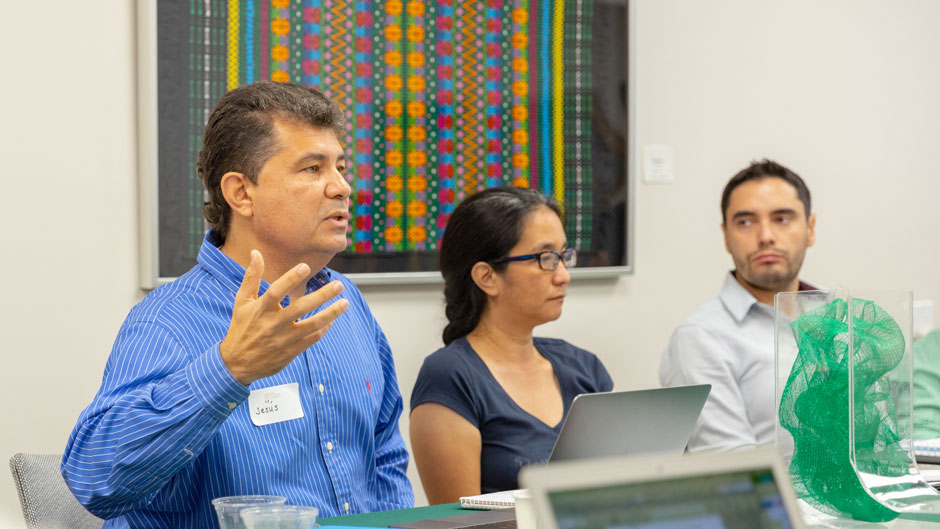In Venezuela, the repressive government of Nicolas Maduro denies the media basic information such as the number killed in the latest street protest.
“Journalists have to go to the morgue and count the corpses,” said Carlos Arcila, a Venezuelan-born former journalist who is now professor of communications at the Universidad de Salamanca in Spain.
In Mexico, journalists continue to be targeted and killed.
Colombia signed a peace treaty with the FARC (The Revolutionary Armed Forces of Colombia) guerrillas but new narcotrafficking gangs are threatening journalists if they cover certain local stories.
These are some of the challenges journalists face in Latin America. Last week, Arcila and some 15 other academics working in Latin America and the Caribbean gathered at the University of Miami Institute for Advanced Study of the Americas for an initial meeting to plan the third phase of The Worlds of Journalism Study (WJS). In the second round, more than 27,000 journalists in 67 countries were surveyed.
The groundbreaking study seeks to understand how journalists view their profession, what challenges they face and what they foresee as to their future contributions to their societies.
“Our goal is to find out what are the priorities for the journalists in the region so that we can study the challenges we face in journalism and journalism studies,” said Sallie Hughes, associate professor in the School of Communication’s Department of Journalism and Media Management. Hughes, who is faculty director at the institute, also heads the Mexican network of the WJS project.
Lourdes Dieck-Assad, vice president for the University’s hemispheric and global affairs, welcomed the group and shared that for the University it was a “priority to work with top notch researchers to learn the challenges journalists face.”
“Without a free press we cannot maintain a democracy,” she said. “As a Mexican, this is a topic that is close to my heart. In this year alone we have had nine journalists killed in Mexico.”
Participants agreed that journalism seems to be under siege, not only in Latin America, but throughout the world. As journalists are targeted, harassed, and sometimes killed for trying to inform the public, the importance of in-depth knowledge of how they perform their craft is tantamount.
Many participants agreed that one challenge that seems to be rampant throughout the region is the precarity of being a journalist.
“Journalists in Venezuela make as little as $7 a month,” said Arcila, adding that it is more profitable to drive a taxi. The low pay for journalists throughout the region forces many to undertake other jobs on the side that often create ethical conflicts. Others just leave the country for more prosperous countries, he said.
In Colombia many journalists’ salaries are tied to advertising revenues, said Jesus Arroyave, professor of communications from Universidad del Norte in Barranquilla. Often, the advertisers demand positive story coverage from the journalist in exchange for payment, he said.
“Colombia is a complex country,” said Arroyave. “The process of covering the post-Peace Accord offers a particular journalistic challenge, but one thing that is general to the region is the precarity of being a journalist.”
The group, which included academics from Brazil, Ecuador, Puerto Rico, Peru, and Mexico, spent the first day of their meeting getting to know each other and beginning to strategize on what common themes journalists faced in each of their countries.
Among these common themes:
- Most countries lack of official registries of professional journalists (which makes identifying them for research a difficult task).
- High incidence of job insecurity (low wages, no contracts, no pensions).
- Large swaths of rural areas in the region lack any local news coverage.
- High percentage of self-censoring by journalists to avoid being targeted.
- An increase in sexual harassment against women journalists.
On the second day of the meeting, the academics continued to strategize and draw up methodology to come up with a core questionnaire that they will use to survey journalists in their own countries. They will also add additional questions fashioned to their country’s needs.
The study will take approximately three years to complete and publish. The first two iterations of the WJS were well-received globally. The second round of the study, titled “Worlds of Journalism: Journalistic Cultures Around the Globe,” will be available in June from Colombia University Press.

